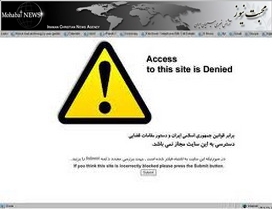The Iranian National Security Ministry is targeting Farsi-language websites which do not adhere to strict Shi’ite Muslim theology. Among those hit in cyber-attacks is Mohabat News, which serves Persian Christians in Iran and surrounding countries.

“The most recent attack took place on august 19, 2011, in which the attackers overloaded the server of MohabatNews and made it to go down for three days,” reported the website. “We are really sorry for the inconvenience. But now with God’s help we managed to transfer the website into a more secure server and we hope such incidents don’t happen again. Thanks for your tolerance.”
However tolerance is the last thing that the Iranian government has in mind. In February, cyber-attacks shut down MohabatNews for two days. The Iranian government has tried with varying levels of success to block access to the site. Although the Christian website is back up and operating from a server outside Iran, others are not.
The security ministry announced the successful elimination of an unspecified Internet network, which officials said had “conducted anti-religious cyberspace propaganda.” The ministry reported that members of that unnamed network had created a variety of web sites, blogs and chat rooms, which it used to spread “anti-religious” information.
In Iran “anti-religious” can mean anything from atheist to non-Shi’ite Islam.
The ministry reported that several people were arrested on suspicion of involvement in the unspecified network. Allegedly the arrested parties admitted under police interrogation that their group’s activities were carried out with the assistance of several embassies of European countries, Israel, and members of the Baha’i community — all which are consider arch-enemies of the Iranian regime.
The statement did not specify what kinds of actions were undertaken.
The number of internet users in Iran has risen sharply in recent years, diluting the government’s control of news dissemination.
The national security ministry set up a special committee to regulate access to the internet, which has had varied levels of effectiveness. The committee has been “tasked to identify sites aimed against the state and religion, as well as pages with immoral content.”
The committee is reportedly comprised of officials from the ministries of culture, national security, communications. Reportedly, they have set out to close the Iranian public’s access to any online resources “with content that does not meet Iranian established standards.”
Mohabat News reported in February:
According to the claims of the Iranian government, more than 5 million so called “immoral” and “anti-Islamic” sites have been blocked. The government announced that this strategy of filtering various sites will be intensified.
In the recent years and since the entry of internet services in Iran, the government not only has blocked “immoral” and “anti-Islamic” sites, but has succeeded to block all other Farsi political and sites that are critical of the regime.
Iranian Christian News Agency (Mohabat News), currently is the only active and up-to-date news agency dedicated to exposing the mass arrests and systematic persecutions against the Christians inside Iran, was attacked by hackers belonging to the Islamic Republic of Iran.
Concurrent with the recent wave of arrests and detentions of many new Christians in Iran, the website of Iranian Christian News Agency, Mohabat News, was not immune from harassments and systematic attacks of government hackers who did not wish to allow this type of news to be released to the world community, and thus attacked and disabled the site for 2 days. Upon careful analysis of these attacks, the technical team of the Iranian Christian News Agency determined that the hackers belonged to the Islamic Republic of Iran.
After the necessary repairs were done and the site was brought back up, this time the government reacted by blocking and filtering the site from the public access in Iran. Therefore, new filter breaking software was introduced in order to allow the Iranian public to access the site.
Also in recent months, the executive manager of the Iranian Christian News Agency was threatened in an email sent by a specialized of the revolutionary guard called “Gerdab” that the he and his family would be targeted and “bad things” would happen to them as a result of such activity.
We ask all brothers and sisters and Christian churches around the world to pray for the safety and security of the Iranian Christian News Agency, the only active news website of Iranian Christians, the staff, and their families.
The news agency describes itself as:
We are a group of Bible believing Christians who believe in propagating the word of God. All of us at “Mohabat News Agency” have made the spreading of the good news of God’s love and forgiveness among Iranians and the Farsi speaking peoples of Afghanistan and Tajikistan our primary goal.
Mohabat New Agency, the news agency of Iranian Christians, is NOT affiliated with any Christian or non-Christian organizations. We are a team of professionals who have accumulated years of experience in the gathering, interpreting, and dissemination of news. Our experience arises from years of experience in the field of Christian news and other topics of interest to our Farsi-speaking peoples.
Mohabat News has turned this experience into the voice of the persecuted church of Iran to reach the ears of the world community.
Moreover, we are utilizing this gifting that the lord has placed in our hearts to bring awareness of what is happening in the world to our Farsi-speaking readers. Thus we can help our Christian and non-Christian Iranians raise their awareness of what goes in our world and in their own country.
Mohabat News will continue to act as a cultural and social bridge between the world community and the peoples of Iran, Afghanistan, and Tajikistan and to better inform the worldwide Church of Jesus Christ and Christian ministries around the world about the life and the welfare of Christian minorities in these Farsi-speaking countries.
